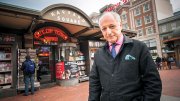A young exile comes to Cambridge, masters his studies, and succeeds—that’s the life story, at Twitter length, of André Aciman, Ph.D. ’88. An Egyptian Jew from a once-wealthy family, Aciman arrived at Harvard in 1973 to study comparative literature. More than a decade later, he earned his doctorate and launched a doubly successful career: writer or editor of eight books of fiction, essays, and memoir, and Distinguished Professor in comparative literature at the Graduate Center of the City University of New York.
His third novel, recently published, is Harvard Square (Norton). In its brisk and stylish prose, an Egyptian Jew from a onetime-wealthy family is a graduate student in Harvard’s comparative literature department, obsessed with Proust and the 1678 French novel La Princesse de Clèves. Set in the summer of 1977, Harvard Square is an interwoven series of romances, with Harvard, women, and an outsider culture vying for the narrator’s attention.
Caught between worlds, the narrator is friendless. At Café Algiers on Brattle Street, he meets an exile from Tunisia who’s everything he’s not: when Kalaj isn’t driving a cab, he holds down a table in a series of Cambridge restaurants, delivering machine-gun bursts of rage that provoke men and, on a good night, attract women.
The narrator’s friendship with Kalaj (a nickname shortened from “Kalashnikov,” for his rapid-fire rants) is anything but a feel-good buddy story. “Perhaps he was a stand-in for who I was, a primitive version of the me I’d lost track of and sloughed off living in America,” the narrator says. “My shadow self, my picture of Dorian Gray, my mad brother in the attic, my Mr. Hyde, my very, very rough draft. Me unmasked, unchained, unleashed, unfinished: me untrammeled, me in rags, me enraged. Me without books, without finish, without a green card. Me with a Kalashnikov.”
Harvard Square is a book of contrasts, all brutal. An undergraduate writing her thesis on Proust comes to talk to the narrator and becomes his lover. She’s any exile’s dream of a trophy wife—beautiful, rich, whip smart, principled, and, of course, a WASP. Lacerated by her nobility and goodness, he ends the romance and returns to Café Algiers, where, as Aciman explains, “Kalaj teaches him how to read people—and once you can read people, you can read books.”
Autobiographical? All of it. Like his narrator, Aciman was obsessed with Proust and La Princesse de Clèves at Harvard. Like his narrator, he was a resident tutor in Lowell House. Like his narrator, he was disabused of his illusions at Harvard. They even share the same Coop number. And as in all of Aciman’s fiction, the narrator is unnamed. “If you write in the first person and use your name, it’s memoir, and if you make up a name, it’s fiction,” Aciman says. “I write ‘faction.’ ”
Novels occasionally pose the question: What is the truth? Because it is so autobiographical, Harvard Square poses that question in a way that presents the reader with an uncomfortable problem. It’s not hard to sympathize with an outsider struggling to assimilate, and Aciman’s narrator is doing his best; as the author says, “The story of my life is the opportunity to marry up.” But assimilation and upward mobility are rarely smooth, and the narrator often falls out of love with Harvard and dreams of going home.
Kalaj, in contrast, shares none of the narrator’s ambivalence. Like the narrator, he’s needy and vulnerable and oh, so lonely, but his tenderness is masked by his nonstop aggression. His hostility toward America is so transparent—“Americans are not born, they are manufactured. Ford-ersatz, Chrysler-ersatz, Buick-ersatz”—that the reader wants Aciman to call it an exaggeration and disown it. But he doesn’t.
“The narrator tells you things he’s not happy about, and Kalaj is even more brutally honest,” Aciman says. “My writing is unusually bold—those rants of Kalaj’s, I wrote them—but I write in a way that’s smooth, even elegant, so you’re not overwhelmed by how savage life can be.”
Harvard…savage? Aciman doesn’t back off. “Have I ever felt at home at Harvard, at home in America? No. But I was no more at home in Egypt. I’m an outsider who is still trying to learn how to fit in. But really, there are no insiders. Like my characters, we’re all exiles.”
Listen to Aciman read aloud from his novel:









